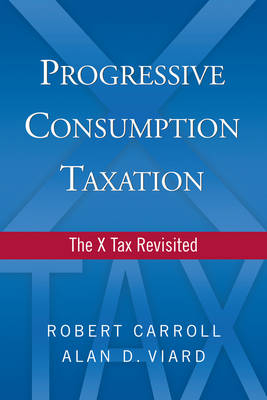
Progressive Consumption Taxation
AEI Press (Verlag)
978-0-8447-4394-3 (ISBN)
- Keine Verlagsinformationen verfügbar
- Artikel merken
The authors argue that the X tax, developed by the late David Bradford, offers the best form of progressive consumption taxation for the United States. To achieve progressively, the X tax modifies the value added tax by splitting its consumption tax base into two components, wages and business cash flow. The X tax applies graduated tax rates to households’ wages and applies a flat tax rate, equal to the highest wage tax rate, to business firms’ cash flows. The authors outline concrete proposals for the X tax’s treatment of pensions and fringe benefits, business firms, financial intermediaries, international transactions, owner-occupied housing, state and local governments, the transition, and other issues.
By adopting the X tax, the United States can preserve tax progressively while promoting economic growth through the removal of tax penalties on saving and investment.
Alan D. Viard is a resident scholar at the American Enterprise Institute. Robert Carroll is vice president for economic policy at the Tax Foundation and co-director of the Center for Public Finance and Research at American University.
LIST OF ILLUSTRATIONS
ACKNOWLEDGMENTS
INTRODUCTION
1. WHY TAX CONSUMPTION?
Removing the Income Tax Penalty on Saving
Gains from Reform
Consumption-Tax Features in the Current Income Tax System
Conclusion
Box: The Trade-off Fallacy
2. THE CASE FOR THE X TAX
The Retail Sales Tax and the Value-Added Tax
The Two-Part VAT
The X Tax: A Progressive Two-Part VAT
Comparing the X Tax to the Personal Expenditures Tax
Conclusion
Box: Optics of the X Tax and the PET
3. MAINTAINING PROGRESSIVITY
Tax Rate Schedule
Assessing the Distributional Effects of the X Tax
Conclusion
Box: Zero Revenue from Taxation of Risky Returns
4. FRINGE BENEFITS AND TRANSFER PAYMENTS
Fringe Benefits
Financing Social Security and Medicare
Public and Private Transfer Payments
Conclusion
Box: Taxation of Gambling
5. BUSINESS FIRMS
General Issues
Distinguishing Wages from Business Cash Flow
Firms with Negative Business Cash Flows
Conclusion
6. FINANCIAL SERVICES
Neutral Tax Treatment
The Problem of Mislabeled Transactions
The Search for a Solution
The R+F Cash-Flow Method
Accounting Methods
Special Cases
Conclusion
7. INTERNATIONAL TRANSACTIONS
The Border Adjustment Question
The “Competitiveness” Illusion
Giving Wealth Away without Really Trying
Above-Normal Returns and Transfer Pricing
Other Cross-Border Issues
Conclusion
Box: Border Adjustment with Fixed Exchange Rates
8. THE TRANSITION
Transition Burden on Existing Capital
Normative Issues
Outline of a Transition Policy
Macroeconomic Policy during the Transition
Conclusion
9. THE NONBUSINESS SECTOR
Owner-Occupied Housing and Consumer Durables
Production by Governments, Nonprofits, and Households
Patrolling the Boundaries of the Business Cash-Flow Tax
Fiscal Federalism under the X Tax
Conclusion
Box: Taxation of Home Resales
10. THE VAT ALTERNATIVE
Subtraction and Credit-Invoice VATs
The Superiority of the VAT to the Retail Sales Tax
Recent Discussion of VAT
Using the VAT to Replace Other Taxes
The “Easy” Stuff
Monetary Policy and Other Transition Issues
Governments and Nonprofits
Implications for Social Security
Combating the “Money Machine”
Conclusion
CONCLUSION
NOTES
REFERENCES
INDEX
ABOUT THE AUTHORS
| Verlagsort | Washington DC |
|---|---|
| Sprache | englisch |
| Maße | 161 x 237 mm |
| Gewicht | 440 g |
| Themenwelt | Recht / Steuern ► Steuern / Steuerrecht |
| Wirtschaft ► Volkswirtschaftslehre ► Wirtschaftspolitik | |
| ISBN-10 | 0-8447-4394-1 / 0844743941 |
| ISBN-13 | 978-0-8447-4394-3 / 9780844743943 |
| Zustand | Neuware |
| Haben Sie eine Frage zum Produkt? |
aus dem Bereich


